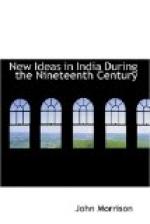The Buddhist period of the Theosophical Society, which came next, is best known to general readers, but is only an episode in its history. In the early “eighties,” we find the society pro-Buddhist, and apparently identifying Buddhism with “the ancient glories of India, spiritual and intellectual,” that the society was professedly desirous to revive. We associate the period with the publication of Esoteric Buddhism, by Mr. A.P. Sinnett, one of the society’s leaders, and with Madame Blavatsky’s claim to be in spiritual communication with Mahatmas [great spirits] in Thibet, the Buddhist land, now robbed of its mystery by the British expedition of 1904. Madame Blavatsky claimed to be receiving letters carried straight from Thibet by some air-borne Ariel. The discovery in 1884 of Madame Blavatsky’s trickery ended the exhibition of “psychical powers,” and also apparently the Buddhist period of the society. That the society itself survived the exposure is proof that it had a deeper root than any mere cult of Buddhism or Spiritualism could give. Its appeal, as we have said, was to the new patriotic feeling in the sphere of religion. To Madame Blavatsky succeeded Mrs. Besant as leading spirit, and to the cult of Buddhism again succeeded the glorification of ancient Hinduism and now also apologies of Hinduism as it is; and to Madras as chief centre of Theosophy succeeded Benares, metropolis of Hinduism. Mrs. Besant proclaimed herself the reincarnation of some ancient Hindu pandit, and called upon Hindus to devote themselves to the study of the Sacred Sanscrit. Supported by many well-to-do Hindus, in 1900 she founded a college at Benares in which Hinduism might be lived and inculcated as Christianity is inculcated in the Indian Missionary Colleges. In the beginning of 1904 a great figure of the goddess Saraswati, the Hindu goddess of Learning, was being erected in the grounds of the College. The subordination of the Indian Theosophical Society, at least in the person of Mrs. Besant, to the pro-Hindu national movement may be pronounced complete. In the sphere of religion, this new Indian consciousness which has enveloped the Theosophists is a force opposed to change and reform. The Theosophical Society, which at the outset professed to be the nucleus of a Universal Brotherhood, is now fostering caste and Hindu exclusiveness, the antitheses of the idea of humanity. Yet, as we shall see, even in the text-books of Hindu Religion prepared for use in the Hindu College, Benares, Christian thought is not difficult to discover. And its meed of praise must not be withheld from the attempts of Theosophists and the Hindu College, Benares, to rationalise current Hindu customs and to reduce the chaos of Hindu beliefs to some system that will satisfy New India. Fain would the Theosophists propound, as we have already noted in the chapter, “New Social Ideas,” that caste should be determined by character and occupation, not by birth. That being impossible, they would




